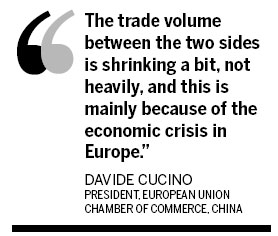European firms 'still confident'

Volume of trade with China shrinking slightly but investment growing
Despite the outlook on profitability declining to an all-time low in China, European companies remain committed to the Chinese market, at the same time calling for further reforms to promote the rule of law and fairer competition.
"Although European companies are faced with tougher conditions in China, including slower economic growth in European and Chinese markets, rising labor costs and competition from privately owned Chinese companies, they are still confident in the marketplace," said Davide Cucino, president of the European Union Chamber of Commerce in China.
The growing investment from the bloc is proof. In the first seven months of 2013, investment from the EU rose by 16.72 percent to $4.64 billion, while the trade volume between China and EU declined 1.8 percent, according to the Ministry of Commerce.
"The trade volume between the two sides is shrinking a bit, not heavily, and this is mainly because of the economic crisis in Europe. Figures are showing that there is still interest from European companies in having a presence in the Chinese market," said Cucino.
In the May release of an annual publication that measures the confidence of European companies in China, the EU chamber said among the 526 respondents, the number of EU companies reporting revenue growth shrank to just 62 percent and only 64 percent of European companies in China were making profits.
But China remains a pillar for global revenue generation. Nearly half of European companies said China now accounts for more than 10 percent of their global revenues. And 86 percent of the respondents are planning further investment to build upon current capabilities and maintain an edge over local competition.
However, in its annual position paper, which was released on Thursday, the EU chamber said the business environment in China should be improved to further foster bilateral cooperation and facilitate China's innovation and productivity in the process of transformation.
In the paper, the chamber praised the encouraging steps to reform China has taken. But it said it was only the start of a long and difficult process to strengthen the regulatory system to better suit an increasingly complex economy.
"Liberalization has stalled and domestic companies - in particular State-owned enterprises - continue to receive partisan treatment," Cucino added.
The EU chamber has been calling for a balance between government control and market forces for years. This year it is emphasizing a reassessment of the government's role in the economy and business environment.
The government's role as a regulator should be strengthened in a way that allows it to become more efficient, protect its independence, leverage transparency and consultation and empower regulatory implementation and enforcement functions, the paper noted.
Cucino said continual reform is important because private companies cannot reach the same finance and resource channels as State-owned companies because of over-intervention by the government.

























